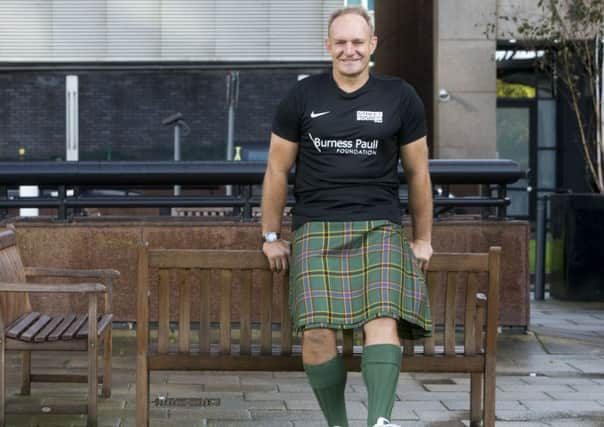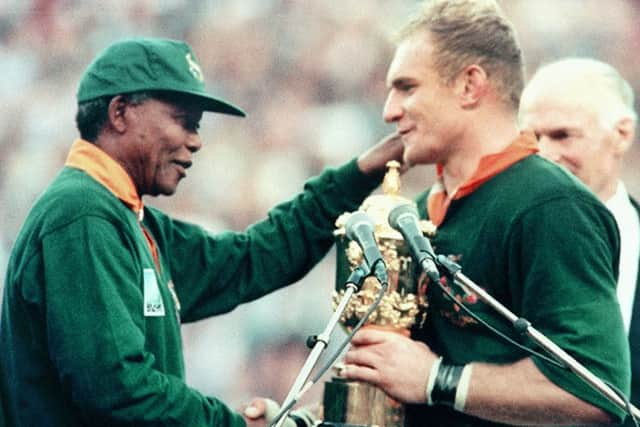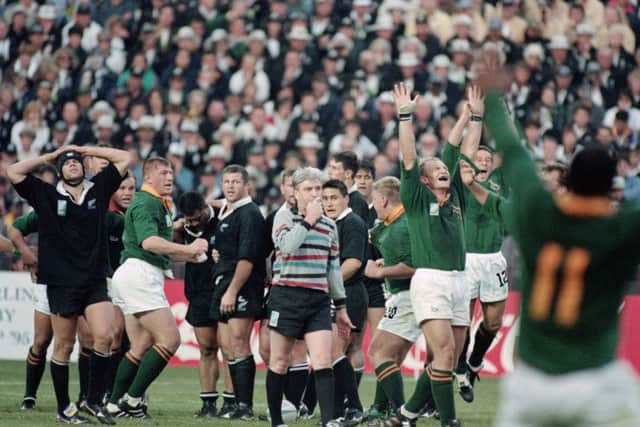Interview: Francois Pienaar on his debt to Mandela, winning the World Cup and sport’s ability to transform lives


It is no exaggeration to suggest that Francois Pienaar’s life will be defined by captaining his homeland to success over New Zealand in the final at Ellis Park on 24 June 1995. Never has a sporting occasion meant more in the context of its political and cultural significance.
The first major event to be held in the country following the end of apartheid, the meeting of two men that afternoon symbolised the nation’s ability to move on from the racist oppression that resulted in the subjugation of the black majority. Pienaar sees himself merely as the white foil for the brilliant leadership skills of his first black president, Nelson Mandela.
Advertisement
Hide AdAdvertisement
Hide AdThe two men developed a friendship following the tournament. In itself that was an expression of change, with Mandela having been incarcerated for 27 years for his refusal to accept the hateful system of apartheid Pienaar confesses he had been “a product of” before having his mind opened at university in the 1980s.


Pienaar’s life became forever entwined with Mandela’s when the Webb Ellis Cup was handed over to him by his president who was sporting a Springboks top. The significance of this gesture could hardly be overplayed since the South African rugby team had come to represent an expression of the white supremacy system that endured in the country for almost half a century.
Mandela’s embrace of rugby pointed a way forward to forgiveness and co-operation that demonstrated the power of sport to drive change. Pienaar’s presence in Scotland this week, to speak at a Street Soccer Scotland Gala Dinner, illustrated his continued belief in the ability of sport to “help with social cohesion” and “give people a platform to boost self-esteem”. Mandela’s actions, in tandem with Pienaar, did that on a grand scale that remains genuinely humbling for the former flanker.
“When I travel today in South Africa it is incredible. If I get on a plane to fly from Cape Town to Johannesburg people – and especially black people – say ‘good morning my captain’. My heart just goes ‘wow’.
“This is now almost 25 years later, and we are still having those discussions, where people reflect on what that event made them feel and think. I’ve said before, I’m just glad that we didn’t know at the time the enormity of that tournament and the effect it would have on the nation. I think it would have been too much.


“We knew it was important – it was a Rugby World Cup final and we trained like mad for it. But we were living from the hotel to the training pitch to the stadium and back. Chester Williams, who just recently passed away, he was the face of that World Cup [as the only black player in the squad]. The campaign motto was: The Waiting Is Over. But Chester got injured and was put out [of the early games]. On the night before we played Samoa I asked him: ‘Tell the team what is happening in our country.’ He said, ‘you guys have no idea. You have no idea what is happening in the streets, and how people are feeling about this World Cup.’ He continued: ‘It is much bigger than anything I have ever experienced.’
“So going into the final was amazing. This was the day, this was the execution of it. You could hear the stadium shaking and the people cheering.
“In those days we were amateurs. Back then you didn’t warm up on the field, you warmed up in the changing room. It was like a sauna of emotions and testosterone in there. I was just wanting to keep the guys calm. And then there was a knock on the door, and in walks Madiba [Mandela], wearing a Springbok. That was so emotional to see that.”
Advertisement
Hide AdAdvertisement
Hide AdThe ultimate world leader Mandela melding with a great on-field one in Pienaar allowed everything to come together as sport and real world crossed over in such a profound manner. Especially when the team visited Robben Island, where Mandela had been held, following their surprise victory over Australia in the opening game.
“I wish I could take credit for that. But it was a perfect storm, actually,” he said. “Things happened and the puzzle came together, with many people building the puzzle. When I met Mr Mandela for the first time, it was when he asked to have tea with me. A couple of months after he became the first black president of South Africa, his aide phoned and said Mr Mandela wanted to have tea with me. It was the most incredible experience.
“And, just before we played Australia, he said he wanted to come and wish the team well. It was on the captain’s run on the Thursday, the helicopter flew in, he came and shook the hands of the players. It was incredible, the aura he had.
“Then, after we won the game, we said we wanted to go – the team wanted to go – to Robben Island. It was just us. There were still prisoners on the island. Not political prisoners. Petty thieves. And they would be mostly coloured prisoners. If you go look at apartheid, the coloured people didn’t support the Springboks. They supported the All Blacks – for obvious reasons.
“But the emotions when we walked into that mess hall, where all these coloured prisoners were sitting, was just insane. I mean, the roof almost came off, they were cheering us on so loudly.
“You could see how proud they were, how excited they were, that we’d beaten Australia and had a shot at the title. All those small things had a major effect on the team and myself. So the puzzle came together but there was no master plan.
“One team one country was our slogan. But that came from our CEO, Edward Griffiths. When we walked into the first photo shoot, there it stood, this slogan. And we said: ‘Yes.’ It was just the perfect storm that came together.”
Mandela wearing the jersey of the oppressors symbolised “hope”, said Pienaar, who doesn’t pretend that the team didn’t have inculcated racial prejudices from being socialised under apartheid.
Advertisement
Hide AdAdvertisement
Hide Ad“I wouldn’t say that the team were all politically aligned, no. Back in 1986… I grew up as a product of South Africa. You’d play rugby, or cricket at the weekends, and children were seen and not heard. You were never part of the conversation – ‘what are you doing here, go and play’. And Mandela would always be in the conversation because politics and sport are what people talk about. His name was followed by ‘racist’, ‘terrorist’, ‘bad man’, ‘murderer’ and you hear that but you never follow the conversation.
“So growing up that is what I heard, but never questioned. Sadly. And I really am sad that I never questioned. I was then at university where I met different thinkers and you fall into Christianity and meet people who don’t believe… really? And you have conversations like you’ve never had. Talking about politics a lot and that was at the change. It was mid-80s and incredibly dangerous with talk South Africa might go into civil war with Mandela being released. So being a student and seeing the activists…In ’86 I drove into Soweto to coach Jabulani high school soccer players to play rugby. Why? Because I wanted to. I guess Mandela would have heard these things. I didn’t do it to get a pat on the back but because I wanted to.
“[Mandela] wearing the jersey… I think it symbolised hope. Because there was hope that this nation might do something extraordinary. On the streets, people were hugging one another. They were sitting down and having a beer. They looked at each other differently.
“If you say it’s one of the biggest moments in sport, I can’t think of anything that would be bigger, in terms of bringing people together.
“I’ve been very blessed to have had private conversations with Mr Mandela. And he laughed a lot, he did. Given his 27 years in jail, that’s remarkable.
“I was very emotional when I walked into Mr Mandela’s cell. I was the last to walk in when we visited Robben Island. And you realise how incredible it is. That place is so small and he was there for 17 years. Yet he comes out and he has forgiveness in his heart, he has compassion and selflessness. He gave so much. But I would say genuine is the one word I would use. He’s real. There is no act.
“It is phenomenal, people want to understand ‘how did that happen’. There is no magic potion. First of all you have to have a leader that has that vision. And if you go and listen to his speech as the first black president of South Africa: ‘The time for the healing of wounds has come, the time to bridge the chasms that divide us has come, and the time to build is upon us’. Those are incredible words – but he delivered on those words. It’s not just saying it. Often-times you get politicians that come up with this incredible speech and then fall flat. He actually delivered on what he said.
“I wish I had hugged him when he handed me the trophy. Because he handed the trophy to me and said: ‘Francois, thank you for what you have done for South Africa.’ I said to him: ‘No, Mr Mandela. Thank you for what you have done for South Africa.’”
Advertisement
Hide AdAdvertisement
Hide Adl Francois Pienaar was speaking at the Street Soccer Scotland Gala Dinner in Glasgow. Street Soccer Scotland delivers a range of football related personal development and training programmes to socially disadvantaged adults and young people across Scotland including in Glasgow, Edinburgh, Dundee and Aberdeen.